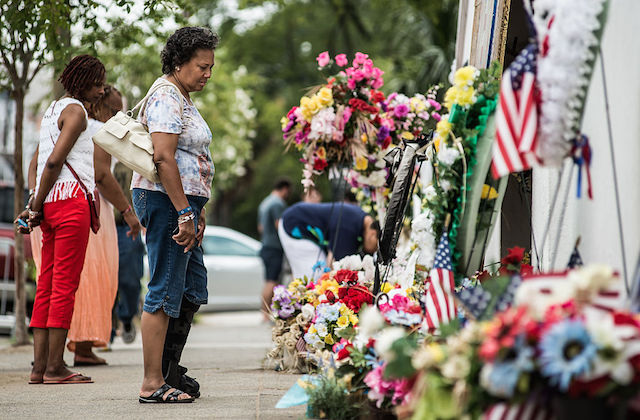Cynthia Hurd.
Susie Jackson.
Ethel Lance.
Rev. DePayne Middleton-Doctor.
Hon. Rev. Clementa Pinckney.
Tywanza Sanders.
Rev. Daniel Simmons Sr.
Rev. Sharonda Singleton.
Myra Thompson.
On June 17, 2015, these nine people who have come to be known as the Emanuel Nine lost their lives. One year ago today, 21-one-year-old Dylann Roof walked into Emanuel African Methodist Episcopal Church in Charleston, South Carolina, sat with parishioners in the Wednesday night prayer meeting for an hour, then opened fire, killing nine of them. Three people lived to tell the tale.
It was soon revealed that Roof, a White man, revered the Confederate flag, was enamored with the number “88”—which the Anti-Defamation League identifies as “numerical code for ‘Heil Hitler’”—and, per a witness, said, “I am here to shoot Black people. You rape our women and you’re taking over our country. And you have to go,” as he pulled out his gun.
Roof confessed to the murders, and now he faces nine counts of murder and three counts of attempted murder in state court. If found guilty, he could be sentenced to death. At the federal level, he has 33 pending hate crime and firearm charges. Attorney General Loretta Lynch announced in May that the Justice Department will also seek the death penalty.
The shooting revived the decades-long conversation about the legacy of the Confederate flag, leading to protest actions like Bree Newsome’s removal of the flag from the South Carolina state capitol and state lawmakers eventual vote to remove it permanently.
The mass shooting also sparked conversation about gun control laws. The FBI revealed last July that a breakdown in their background check system allowed Roof to purchase the gun he used in the attack. From The New York Times:
Despite having previously admitted to drug possession, the man, Dylann Roof, 21, was allowed to buy the .45-caliber handgun because of mistakes by F.B.I. agents, a failure by local prosecutors to respond to a bureau request for more information about his case, and a weakness in federal gun laws….
Two days after Mr. Roof tried to buy the weapon, an examiner at the F.B.I.’s national background check center in Clarksburg, W.Va., began investigating his criminal history. The examiner found that Mr. Roof had been arrested this year on a felony drug charge, but not convicted. The charge alone would not have prevented him from buying the gun under federal law. But evidence that Mr. Roof had been convicted of a felony or was a drug addict would have resulted in a denial, so she continued to investigate his background.
Because Mr. Roof had been arrested in a small part of Columbia that is in Lexington County and not in Richland County, where most of the city is, the examiner was confused about which police department to call. She ultimately did not find the right department and failed to obtain the police report. Had the examiner gained access to the police report, she would have seen that Mr. Roof had admitted to having been in possession of a controlled substance and she would have issued a denial.
The examiner, however, did send a request to the Lexington County prosecutor’s office, which had charged him, inquiring about the case. The prosecutor’s office, however, did not respond.
Around that time the three-day waiting period expired, and Mr. Roof returned to the store and purchased the gun.
This week, as the nation remembers the Charleston Nine, it also mourns the loss of 49 lives on June 12, 2016, in what is now the deadliest mass shooting in U.S. history. Shooter Omar Mateen stormed LGBTQ nightclub Pulse Orlando with two legally purchased guns, resulting in the death of 49 primarily Latinx and Black partygoers. The massacre has pushed President Barack Obama and nearly 40 senators to renew the call for a ban on assault weapons, stricter background checks and no access to guns for people on terrorist watch lists.
In Charleston, the church now operates under what church historian Liz Alston calls “the new normal.” From a recent interview with NPR:
We have been placed on the international scene. The church has been—has become a pilgrimage. Every Sunday, we are blessed—that’s the word—with the visitors from around the world, not out of curiosity, but people just want to come to the place so that they can give their thanks and to be a part of the church. They are persons who’re just pleased just to come and stand outside. They say we don’t have to come inside. We just want you to know we are with you. It has changed me as an individual.
